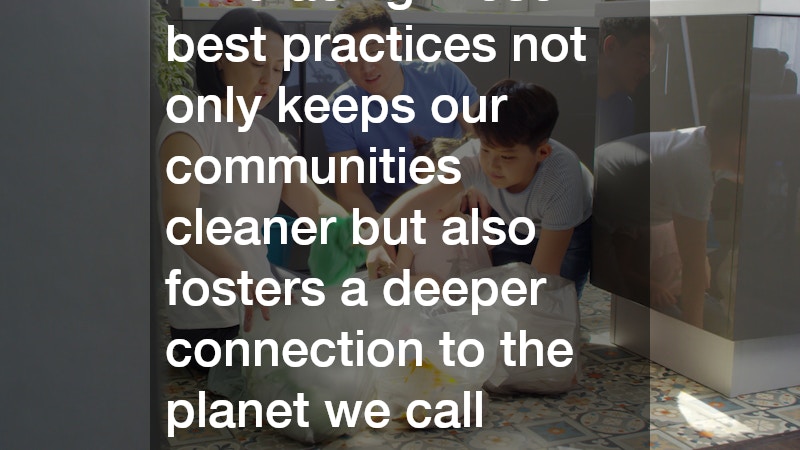As environmental concerns grow, Australians are increasingly committed to sustainable living. One of the simplest and most effective ways individuals can contribute to a healthier planet is by improving how they manage household waste. Knowing the best practices for recycling not only helps reduce landfill waste but also conserves valuable resources and supports the circular economy. This guide explores practical and impactful methods that every Australian household can adopt to enhance their recycling efforts.
Understand What Can & Can’t Be Recycled
A fundamental step in effective recycling is learning what materials are accepted in your local council’s recycling bins. While most councils accept items such as paper, cardboard, glass bottles, rigid plastics and aluminium cans, there are important exceptions. For instance, soft plastics, greasy pizza boxes and broken ceramics are generally not recyclable through kerbside programs.
To avoid contamination, it’s crucial to rinse containers and remove food residue. Placing the wrong items in the bin can lead to entire batches of recyclables being sent to landfill. Check your local council’s website for specific recycling guidelines to ensure compliance.
Separate Materials Correctly
A best practice in recycling is proper sorting. If your area offers a split bin or multiple bins for different recyclables, be sure to place items in the correct compartment. Separate paper and cardboard from plastics and metals. Glass should be kept separate if required by your local recycling facility.
Moreover, avoid bagging recyclables in plastic bags unless specified. Most facilities cannot open these bags, resulting in recyclable materials being discarded. Place items loosely in the bin for more efficient processing.
Embrace Container Deposit Schemes
Many Australian states have implemented container deposit schemes (CDS) that provide a refund for returned beverage containers. Participating in these schemes not only puts some extra change in your pocket but also significantly reduces litter and increases recycling rates. Keep eligible containers separate and drop them off at designated collection points.
Reduce & Reuse First
While recycling is vital, it’s part of a broader waste hierarchy: reduce, reuse, recycle. Reducing consumption in the first place is the most effective way to minimise waste. Choose reusable alternatives like stainless steel water bottles, cloth shopping bags and glass food containers.
Before tossing something out, consider whether it can be reused. Old clothes can become cleaning rags and glass jars can serve as storage containers. Creative repurposing can reduce your recycling load and extend the life of items.
Compost Organic Waste
Food and garden waste make up a large percentage of household rubbish. Composting at home is an excellent way to divert this waste from landfill, where it would otherwise produce methane, a potent greenhouse gas. Whether you use a backyard compost bin or a worm farm, composting transforms organic waste into nutrient-rich soil for gardens.
Some councils offer food organics and garden organics (FOGO) bins as part of their kerbside service. If this option is available, ensure food scraps, coffee grounds and garden trimmings are placed in the FOGO bin rather than in general waste.
Be Mindful of E-Waste
Electronic waste or e-waste, includes items like phones, computers, printers and batteries. These items contain hazardous materials that should never be disposed of in general waste. Fortunately, Australia has designated e-waste recycling programs that safely recover valuable materials.
Take advantage of collection events or drop-off points at retailers like Officeworks and JB Hi-Fi. Ensure data is wiped from devices before recycling. Proper handling of e-waste not only protects the environment but also reduces the need for raw material extraction.
Support the Circular Economy
Recycling doesn’t end at the bin. Supporting the circular economy means buying products made from recycled materials and choosing items designed for durability and recyclability. Look for packaging with clear recycling labels and companies that prioritise sustainable practices.
By supporting businesses that embrace circular production models, consumers can help close the loop and create demand for recycled goods. This helps build a more resilient and environmentally conscious economy.
Educate & Involve the Community
Best recycling practices become more effective when shared. Encourage friends, family and neighbours to stay informed about local recycling rules and participate in community initiatives. Schools, workplaces and social groups can organise awareness campaigns or clean-up events to promote responsible waste management.
Teaching children about recycling from a young age helps establish lifelong habits and fosters a culture of environmental stewardship across generations.
Audit Your Waste Regularly
Conducting a home waste audit can help identify opportunities to reduce and recycle more effectively. Take a look at your household bin each week. Are there items that could have been composted or reused? Are non-recyclables ending up in the recycling bin?
A quick review can highlight areas for improvement and help families make smarter choices moving forward.
Stay Up to Date with Recycling Trends
Recycling practices evolve over time. New technologies and changing regulations mean what was once accepted may now be excluded or vice versa. Stay up to date by subscribing to your local council’s newsletter or checking the Planet Ark website for national recycling tips and tools.
Being informed ensures you’re not inadvertently contaminating your bin and helps you adapt your habits as new opportunities arise.
Making Recycling a Habit for a Greener Tomorrow
Recycling is more than just a weekly chore — it’s a commitment to protecting our environment and future generations. By understanding what belongs in the recycling bin, reducing waste and choosing sustainable alternatives, Australians can make a tangible difference. Embracing these best practices not only keeps our communities cleaner but also fosters a deeper connection to the planet we call home.
.

